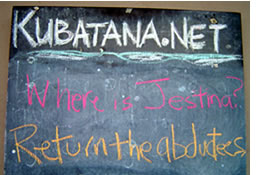As you wake up you might have the audacity of mumbling a few words of thanksgiving to the Almighty for the new day that has come up and also for guidance on the day’s adventures.
As is the case everywhere you run straight to the toilet to relieve yourself of the digested air in your stomach only to receive a shout from the person cleaning the toilet (probably on duty that week) that you can’t expect to use the toilet when there is no water. Blaming yourself for your ignorance you walk into your room pondering your next move because relief will only be possible after it gets dark, in the nearby veld.
You prepare for the day and as you move towards the wardrobe you just realize it is a mere waste of time as all the clothes are lying in the washing basket and you didn’t do any laundry for the past two weeks due to the acute shortage of water in your suburb. Again you curse yourself for such self attained stupidity and you proceed to the washing basket to look for something that is a little bit clean so that you can put it on. Luck strikes you and you find this pair of jeans that you have worn only once in the past two weeks and a t-shirt that is semi-clean. But these need to be ironed for a better impression and alas there has been no electricity for the past three days due to a transformer fault and surprisingly it is only your residential line that has been affected by this since the guys across the street have electricity.
This means double trouble since there is going to be no breakfast and already this is triplicating the issue since you did not have supper the last night.
Finally, with the wretched clothes on, you board a Kombi but to your surprise the fare the conductor was shouting for a single trip has doubled the moment the Kombi starts the journey and you have no option but to fork out the $500 000 that you got from the Bank yesterday and pay the fare. When you get to town it is again a surprise to find out that the queue to your bank has gone past three or four blocks and there is no option but to wait in the queue. The thought of being a professional, having graduated from one of the country’s renowned universities, but still unemployed, makes you think it as improper to wait for a paltry sum.
You make it to ZIMEX mall were you intend to change the ZAR 100 that you had got from a relative. As you line up a buyer (because buyers are now being outnumbered by sellers there is a queue) a pickpocket slips their hand into your pocket and gets the much depended on ZAR 100. Meanwhile they also wait in the queue behind you to change their loot. You approach the buyer and you put your hand in the pocket to look for the money but it is to no avail. The confusion that surrounds you makes the other people around you think that you are a thief and the next thing that happens is you are chased from the place, even by the same people that stole your money.
The next thing to do would be to report the rascal to the police so that they can be brought to book and within you there is a feeling that the police should wipe all the dealers away from the Mall just because of your case. Horror strikes you as you get to Harare Central Police Station when you find there is a queue so large even as compared to the one at the bank. You think it is for those that want to have their documents certified and you “jump” the queue only to receive a lash from the Officer on duty telling you to go to the back of the queue. Attempts to explain your issue are fruitless as the Officer is already attending to some people that have been brought in on charges of “illegal” vending of bananas at Copacabana Market in the City Centre.
Everything about, and around you seems to be hard hit by complications and there is no way to solve any of the issues at stake. In the long run you become loser in your bid to be a winner in the race for your own economic stability in a country like Zimbabwe.
 Six days after Jestina Mukoko was abducted from her home, she is still missing. This morning, two of her colleagues were also abducted from the ZPP’s Harare offices. Just days before her abduction, in remarks to the Women’s Coalition to mark the 16 Days of Activism, Jestina discussed the horrors experienced by many Zimbabwean women during political violence this year.
Six days after Jestina Mukoko was abducted from her home, she is still missing. This morning, two of her colleagues were also abducted from the ZPP’s Harare offices. Just days before her abduction, in remarks to the Women’s Coalition to mark the 16 Days of Activism, Jestina discussed the horrors experienced by many Zimbabwean women during political violence this year.









